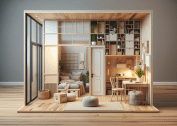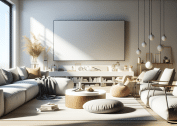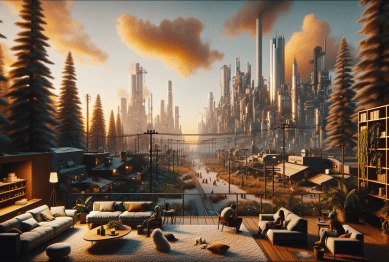In today’s fast-paced world, distractions are constant and focus is a precious resource. One often overlooked way to improve concentration and productivity is by simplifying your physical environment. Simplify your space to strengthen your focus—this principle has gained significant attention recently, especially as remote work and digital overload challenge our mental bandwidth. By decluttering your surroundings and creating a calm, organized space, you can improve your ability to concentrate, think clearly, and get more done.
This article explores the emerging trend of minimalism and environmental simplification as a practical approach to mental clarity. It also provides actionable tips backed by research on how you can transform your space and your mind.

Why Simplifying Your Space Matters for Focus
Our environment significantly impacts our cognitive functions. Visual clutter and disorganization compete for our attention and overload the brain, making it difficult to sustain focus on important tasks.
According to a study published in the Journal of Neuroscience, visual clutter reduces the brain’s ability to process information efficiently, which in turn decreases attention span and working memory capacity ). Another study by Princeton University found that clutter in the physical environment inhibits the brain’s ability to focus on relevant tasks.
Simplifying your space helps by:
- Reducing cognitive load: Fewer distractions allow your brain to allocate resources to the task at hand.
- Enhancing decision-making: When your environment is orderly, your brain spends less energy filtering irrelevant stimuli.
- Creating calmness: A tidy space is associated with lower stress and anxiety levels, which further supports focus.
The Emerging Trend: Minimalism and Focus
Minimalism as a lifestyle has moved beyond just aesthetics and into productivity science. The “less is more” philosophy now underscores an evidence-based approach to boosting mental performance.
Many companies and individuals are adopting minimalist design principles in their workspaces to reduce sensory overload and improve concentration. Google and Apple, for instance, emphasize clean and open office designs that avoid visual clutter, encouraging employees to maintain focus .
Additionally, digital minimalism—a practice popularized by author Cal Newport—advocates for reducing unnecessary digital distractions as a counterpart to physical decluttering. Together, these movements are reshaping how we approach work and focus in an increasingly noisy world.
Practical Steps to Simplify Your Space and Strengthen Your Focus
You don’t need to completely redesign your environment overnight. Start small with manageable changes and build a routine to maintain clarity in your space.
1. Declutter Your Immediate Work Area
Focus on your desk or primary workspace. Remove items that do not serve your current tasks. Keep only essential tools like your computer, notebook, and necessary stationery.
- Use storage containers or drawers to hide away items that are used less frequently.
- Adopt a “one in, one out” rule: for every new item introduced, remove another.
- Commit to tidying your workspace at the end of each day to sustain order.
2. Limit Visual Distractions
Visual noise can drain your attention even if it’s outside your direct task.
- Position your desk to face a blank wall or a simple background rather than a busy room or window.
- Use cable organizers to reduce tangled cords and maintain clean surfaces.
- Choose neutral or soft colors for your workspace to minimize sensory overload.
3. Adopt a Digital Decluttering Routine
Digital clutter can be just as distracting as physical mess.
- Organize files and desktop icons into folders, and archive or delete unused items.
- Unsubscribe from unnecessary emails and silence non-essential notifications.
- Use apps designed for focus, such as “Focus@Will” or “Forest,” which encourage sustained concentration through minimalist digital environments.
4. Create Zones for Different Activities
If your space allows, designate specific areas for different tasks: work, relaxation, reading, and creativity.
- Separating zones mentally cues your brain to switch modes.
- When you enter your work zone, your mind is primed for focus; when in relaxation zones, it’s easier to unwind.
5. Regularly Reassess Your Space
Your needs and tasks evolve over time.
- Schedule a monthly or quarterly review of your space.
- Adjust or remove items that no longer contribute to your focus or productivity.
- Celebrate the benefits of simplicity by noting improvements in your concentration or stress levels.
Psychological and Health Benefits of a Simplified Space
Creating a minimalist environment impacts not just productivity but overall well-being.
- Reduced Stress: Clutter has been linked to increased levels of cortisol, the stress hormone, in women.
- Improved Sleep: A tidy bedroom contributes to better sleep quality, which directly affects mental clarity and focus.
- Enhanced Creativity: Open spaces encourage flexible thinking, allowing for novel idea generation.
These benefits collectively enhance your ability to focus deeply and work efficiently.
Addressing Common Challenges
Simplifying your space isn’t always easy. Here are ways to overcome typical obstacles:
- Emotional Attachment: Let go of items that no longer serve your present life by photographing keepsakes or repurposing them in small ways.
- Time Constraints: Use the “5-minute rule” — spend just five minutes each day decluttering a small area to avoid overwhelm.
- Shared Spaces: Collaborate with others in your household or office to maintain shared spaces by agreeing on simple organizing rules.
Conclusion
Simplify your space to strengthen your focus is more than a trend; it’s a practical approach supported by science and widely embraced by modern productivity experts. Reducing clutter and distractions in your physical and digital environments frees your brain to work efficiently and creatively. Whether it’s a clean desk, a minimized digital landscape, or thoughtfully designed zones, these strategies build a foundation for sustained mental clarity.
By committing to ongoing simplification, you’ll find your focus sharpen, stress decrease, and creativity flourish — all leading to better performance and a healthier mindset.
References
- Journal of Neuroscience – Visual Clutter Reduces Brain Efficiency
https://www.jneurosci.org/content/35/10/4017 - Princeton University Study – Clutter Limits Focus
https://www.sciencedaily.com/releases/2011/03/110310122345.htm - American Psychological Association – Clutter’s Impact on Stress
https://www.apa.org/news/press/releases/2010/03/clutter - Harvard Business Review – Google’s Office Design and Productivity
https://hbr.org/2018/09/how-google-simplified-its-workspaces-to-boost-productivity - NCBI – Cortisol Levels and Clutter
https://www.ncbi.nlm.nih.gov/pmc/articles/PMC4734146/









